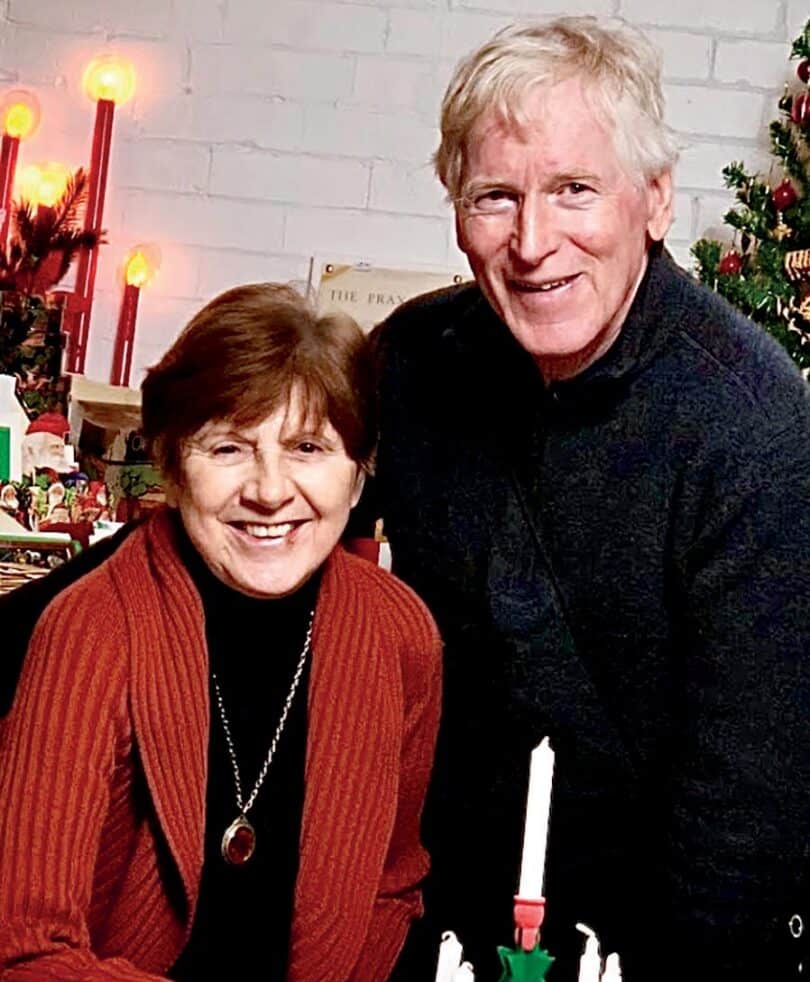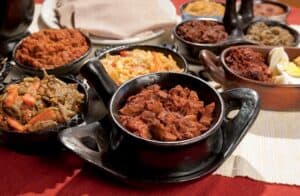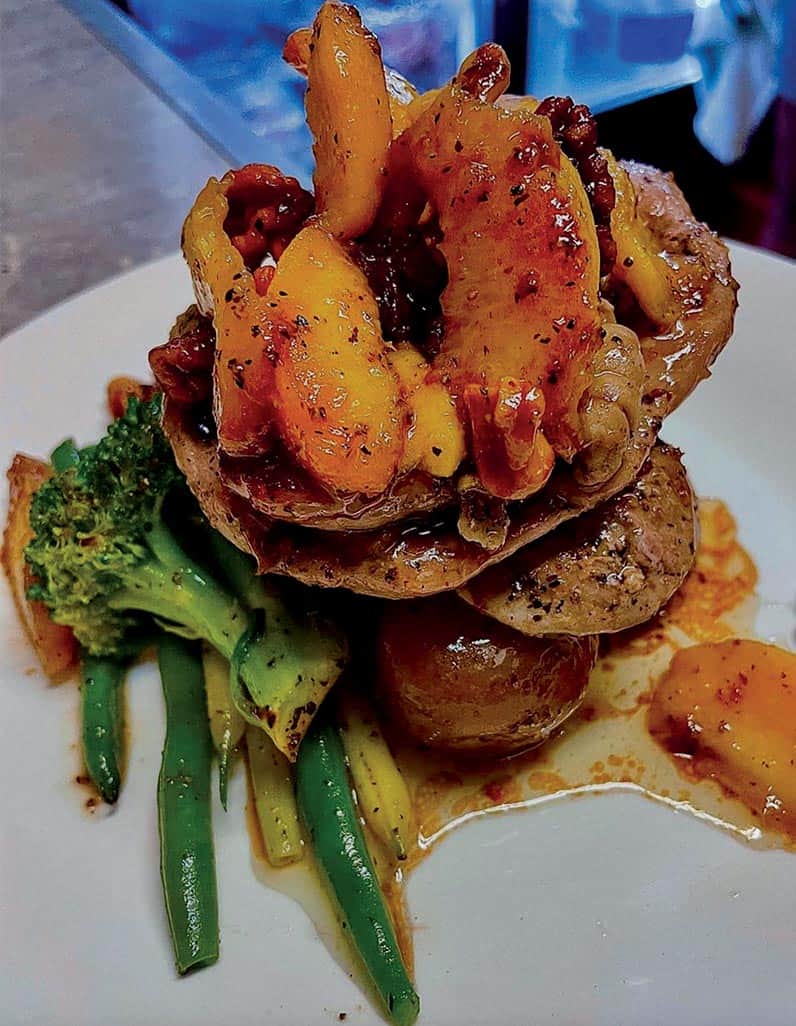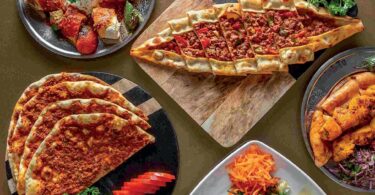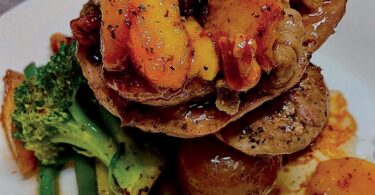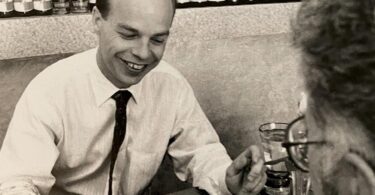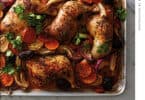Ann McColl Lindsay
London, Ontario has a storied history of exceptional restaurateurs, chefs and culinary retailers. Among the latter were the late Ann McColl Lindsay and her husband, David Lindsay, the former proprietors of the legendary Ann McColl’s Kitchen Shop, one of Canada’s finest cookware stores.
Ann and David met, married, and taught school in Windsor, Ontario, from 1961 to 1968. They resigned their positions, sold their red brick bungalow, and embarked on a year-long food pilgrimage across Europe while camping in a Volkswagen van. Travelling in the van with a gas burner allowed them to experience the local terroir authentically.
The first six months of their trip, which ended at the French border, are described in Ann’s memoir Hungry Hearts — A Food Odyssey across Britain and Spain. The second volume, Hearts Forever Young, includes their travels in France, Italy, Austria, Switzerland, Germany, Belgium, the Netherlands and Denmark.
During this time, they started to collect the one-of-a-kind utensils that would comprise a valuable and saleable batterie de cuisine. Of a foray to British food writer Elizabeth David’s Kitchen Shop, Ann says, “This innocent morning’s shopping expedition turned into a lifetime obsession.”
Upon their return to Canada, they opened Ann McColl’s Kitchen Shop and Victoriana in rented premises on Dundas Street, where they lived above the shop. They specialized in culinary utensils, antiquarian books, furniture, and Victorian paraphernalia.
About this time, the Lindsays befriended restaurateurs Ginette Bisaillon and Robin Askew, who opened the seven-table Auberge du Petit Prince and later Café du Midi. Chef Chris Squire purchased the Auberge in 1976 and operated the landmark business for 21 years. Another stalwart friend of the Lindsays was Hilary Alderson Moon, who opened the legendary Say Cheese restaurant in 1969. Say Cheese was the first and only specialty cheese boutique and restaurant in London at the time—a status it maintained until its closure in 1994.
After several years on Dundas Street, the Lindsays moved to new premises with beautiful storefront windows on Richmond at Hyman Street. Around this time, Ann began writing cookbooks while David, a talented artist and photographer, illustrated them.
In 1977, Ann authored The Cookshop Cookbook, which instructed readers in the use and care of kitchen utensils and equipment. “We had always been traditionalists in the matter of kitchen equipment, shunning all electrical contrivances and putting our faith in good knives, sieves, mortar and pestles. The autumn of 1975 saw a change in all that. The Cuisinart Food Processor arrived in Canada, and automatically half the stock in our store became obsolete,” wrote Ann.
Despite this shift, the business prospered and eventually outgrew that location. In the 1980s, they relocated the shop to 350 Talbot Street. Built in 1890, the building was originally a showroom and repair shop for the Massey-Harris Company.
To this day, the landmark building remains a strong reminder of the late nineteenth-century commercial activity in downtown London.
The new store became one of the most professionally stocked and artistically merchandised cookware shops anywhere. It offered bakeware, pots and pans, woks, scales, utensils, gadgets, drain boards, glassware, bowls and numerous specialty cooking tools. A unique feature was the step-down kitchen in the renovated tractor repair shed, complete with an AGA stove for cooking classes and demonstrations.
Already outspoken heritage activists—having four of their buildings designated—the Lindsays campaigned for the preservation of the Talbot Block streetscape, culminating in the memorable “Hands Around the Block” demonstration. Ann’s commentaries on culinary matters, urban issues and heritage preservation appeared in countless newspaper articles, magazines and letters to the editor over the years.
When the Lindsays announced their retirement and the closing of their King Street store in 2002, it created an opportunity for Jill Wilcox to expand Jill’s Table into that location. The new space was four times larger than Jill’s original market shop, allowing Jill’s Table to partially fill the void left by Ann McColl’s Kitchen Shop. Wilcox has since built tremendous success, running one of London’s favourite culinary and specialty food destinations.
During their 33 years in the kitchenware business, the Lindsays were also avid gardeners at their home in Woodfield and in community gardens. They are still remembered fondly as a benchmark for blending art, culture and commerce. They continued to be intrepid market enthusiasts, artists, heritage preservationists and community boosters.
In 2006, the Auberge building was acquired by Alain and Donna Arroyas, operators of the successful Archie’s Fish and Chips. Their daughter, Nicole Arroyas, trained for several years in culinary schools in France under star chefs and later relaunched the Auberge du Petit Prince, serving Londoners with classic French cuisine for several years. Today, Nicole runs The Coop Supply Co. Restaurant and Catering, renowned for its outstanding chicken—fried or rotisserie—with sides, fried chicken sandwiches and fish and chips (thecoopsupply.co).
Since 2017, the Arroyas family has rented the former Auberge premises to Growing Chefs! Ontario, a unique Canadian children’s cooking and nutrition program. Based on the idea that education can influence behaviour, Growing Chefs! and its many volunteers have made tremendous strides in changing the way many children perceive food and encouraging them to become excited about nutritious and healthy food choices.
Growing Chefs! also operates the wildly successful Londonlicious festival twice a year.
Londonlicious relaunched in 2023 to assist in the recovery of the restaurant industry, which was rebuilding after the dire effects of the global pandemic.
The goal of Londonlicious — excellent restaurants showcasing the best locally grown products and spotlighting what is unique and delicious in London — is to support local restaurants, growers, farmers and suppliers, and strengthen relationships between local agri-food businesses.
Bryan’s Tasting Notes
London has many outstanding immigrant-owned restaurants serving excellent global cuisine. T.G. Haile of TG’s Addis Ababa Restaurant, one of my favourites, remains a skilful chef at the top of her game. Her signature dishes from the repertoire of Ethiopian cookery comprise permutations of sweet, bitter, sour, salty, hot, and fragrant. Refined flavour contrasts are the hallmark of T.G.’s cooking.
Bhan Mudliar’s The New Delhi Deli at Covent Garden Market is another favourite. I am especially fond of her oxtail and goat dishes.
Other excellent stand-out hot spots include Rosa’s Pupuseria, which serves Latin American cuisine; Ivanopoblano, offering 100 percent organic Mexican with plenty of flavour and pizazz; Udipi Krishna, with Indian thali platters combining traditional vegetarian options; and Basha Lebanese Restobar, which embodies the cuisine, luxury, and hospitality of high-end Lebanese culture in Hyde Park.
Additionally, Esto Es Columbia Restaurant & Bar, located in Vice Supper Club on King Street, has recently opened and is serving authentic Colombian cuisine.
Sulav and Chhavi Sharma’s comfortable Organique Cafe & Eatery in downtown London serves fresh juices, smoothies and smoothie bowls, as well as house-made baked goods with gluten-free options. Using ethically harvested ingredients, non-GMO and organic, it offers teas, premium coffee-based beverages, and seriously good panini sandwiches. Try the sumptuous butter chicken or the chicken parm, both with sensational flavour profiles. The espresso machine, a hefty investment, may not be a Mercedes, but it is a BMW, says Chhavi.
organiquecafe.com
The exceptional Turkish cuisine and hospitality at Omer Tuna and Melike Ozturk’s Kebab-Tu have made me a repeat customer, often returning with friends and family — from the sizzling perfection of Chef Melike’s succulent charred kebabs to the authentic flavours of lahmacun, a Middle Eastern thin flatbread topped with minced lamb and crushed tomatoes, baked crispy but flexible enough to roll for eating.
The sensational iskender kebab consists of sliced doner kebab meat slathered with hot savoury tomato sauce over pieces of housemade pita, accompanied by melted sheep’s milk butter and creamy yogurt. The pita soaks up the sauce and becomes pudding-like underneath the meat. The casual restaurant is unlicensed.
kebab-tu.ca
My Culinary Journey
In my fledgling years, I was fortunate to have several dedicated mentors with an interest in gastronomy, and to have the opportunity to work with talented chefs, sommeliers and restaurateurs, all with strong work ethics and skill sets that helped me develop a traditional culinary backbone. My real education and passion for the culinary arts began while working at a series of French restaurants in Toronto that were bastions of haute cuisine. The way I saw it, French seemed to be the only serious way to dine. Initially, I was an ardent student of regional French cuisine, but after trips to Italy, I had to acknowledge that I was drawn to regional Italian cooking. Eventually,y I moved beyond France as my primary focus of interest, only to return to the traditional French classics over the past five years.
As far as I can remember, travels in Europe and my introduction to food writers MFK Fisher, Elizabeth David and some snarky British restaurant reviewers was how my passion for food writing developed. In any case, it was Italy where I first encountered giant turtles fated for soup pots, wild game, a variety of unusual, feathered birds and truffle-hunting dogs. I enjoyed scouting the open-air food markets in Pisa and Florence and the Rialto market on Venice’s Canal Grande. The Italian market was my nirvana, with its abundant varieties of fresh and saltwater fish and shellfish, the night markets piled high with seasonal produce, fresh fungi and obscure and illegal local cheeses.
Twenty-five years ago, I was invited to partake in a hands-on cook’s tour with other Canadian chefs in the Italian region of Emilia-Romagna. This eye-opening culinary journey was my first introduction to Slow Food. This worldwide movement aims to safeguard traditional regional specialties, time-honoured techniques, and a farm-to-table ethos. It was on this enlightening educational trip that I had an epiphany about regional culinary authenticity. I soon became a dedicated proponent of Ontario’s local food movement and homegrown terroir.
In retrospect, I have had a rewarding career in many aspects of the culinary arts, as a chef, restaurateur, caterer and democratic food writer. I remain gratified by loyal and generous patrons and industry friendships, and to be associated with establishing, owning, or being in partnership with many great restaurants that became a way of life, but more importantly, an ideology. My return to Blackfriars Bistro five years ago, a restaurant I co-founded with Betty Heydon 30 years ago, has given me a platform to lead and champion essential initiatives in the community during and post-COVID, and now, when we are facing transformational times. I intend to retire within the next six months, and we are now actively looking for someone to take over our successful operations in Blackfriars. In the meantime, it’s business as usual.
A culinary entrepreneur, writer, and chef, BRYAN LAVERY operates Blackfriars Bistro & Catering, Blackfriars Emporio and Forest City Culinary Experiences.
ethicalgourmet@yahoo.com


